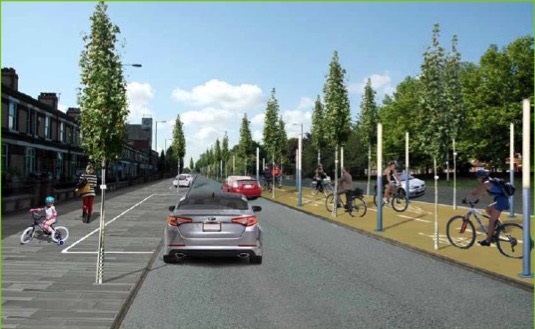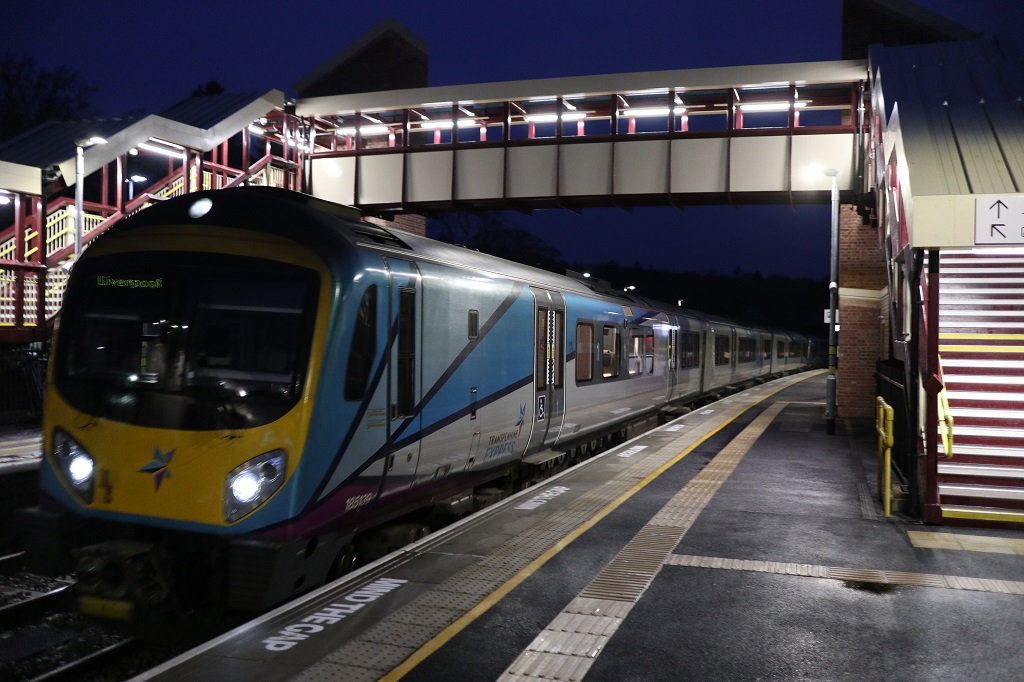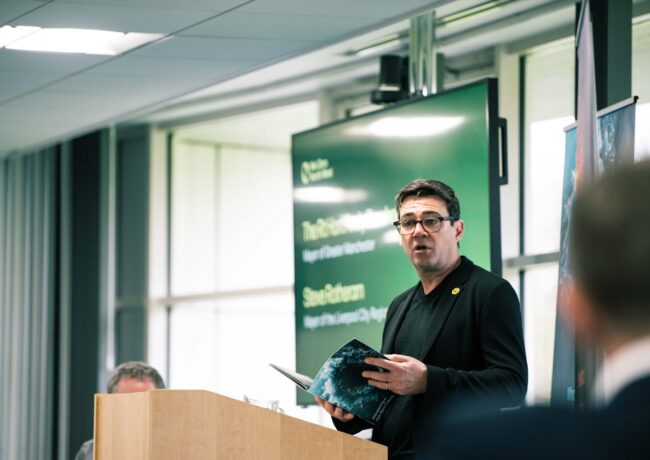Oxford Road design ‘lacks ambition, endangers cyclists’
 Following the publication yesterday of Transport for Greater Manchester's video fly-through of new cycle lanes for Manchester's university district, one of the city's senior designers responds.
Following the publication yesterday of Transport for Greater Manchester's video fly-through of new cycle lanes for Manchester's university district, one of the city's senior designers responds.
See TfGM video below
The designer, who asked not to be named, wrote to Place overnight with the following review of the proposals:
For decades the approach to street design has been too heavily focused on facilitating longitudinal movement of motor vehicles to the detriment of everything else that wants to happen in the same spaces. Much has been written and discussed on this topic, with government agencies and design institutions publishing design guidance to help local authorities move away from a car dominated environment. The increasing popularity of cycling, particularly in the last five years, has demonstrated a shift in public opinion, helping politicians and local authorities take more risks knowing there is public support for such changes.
It is important to note that these risks are ones of perception and general inherent resistance to change, any change. There is a national and an international body of studies, empirical evidence, research papers and successfully delivered schemes that provides comfort and support to address these risks.
Oxford Road Manchester is an excellent opportunity for Manchester City Council and TfGM to harness this paradigm change and capitalise on the work and projects that have been delivered elsewhere to design a scheme that would be a world class exemplar of high quality urban infrastructure. The current proposals for the street are simply not ambitious enough. Cycling through this student dominated university campus should be given the highest priority within the space, while maintaining bus routes in parallel.
Rather than stringing sections of segregated cycle paths together with breaks at junctions and diving on and off the bus prioritised space, it should be seamless.
A more ambitious Oxford Road should have a generous cycling route running the full length of the street, placed in the centre of the street, it should run straight through the junctions, such that all other transport is subordinate to cyclists. The dressing and materials used to form the space should not have conventional lining, marking and basic black tarmac, but should rely on the new landscape, human interaction, the activities of the street frontages extending out into the spaces and the use of a basic rolled materials (similar and comparable in cost to tarmac) but different colours with clever use of detailing to distinguish particular issues of cross movement or dedicated crossings for pedestrians. This landscape could be punctuated with new green infrastructure to soften the environment and incorporate some meaningful sustainable drainage systems into the street, managing water and marshalling movement.
Oxford Road needs to be designed as a complete composition and calls for a more sophisticated response to this brief. The current proposals are a binary response to the complex and broad range of demands placed on the space. If a new design standard can't be set for this project MCC will struggle to convince anyone that it is serious about delivering innovation and hamper the city's ability to attract the skills, talent and businesses it desires as part of its drive to be a world leading knowledge economy.
[VIDEO: 66]





Does anyone else get the impression that this senior designer is a cyclist? Why should other traffic be subordinate to cyclists? I think the cycle paths suggested in the new plans are much more fluid and the diving on/off the bus spaces is probably safer than having them right in the middle of the road. What happens if a cyclist happens to fall of their bike? They’ll be straight under a bus!! Next you’ll be calling for a complete ban of all traffic apart from cyclists along Oxford Road
By MancLass
I fully agree with these comments. We all know that times are tough, but everyone who cares for Manchester needs to keep some senior managers smarter than their work has evidenced in recent times. Being a smart city was our USP, and it is about being clever, not fancy data graphics.
By CityTony
Great points. Hope these were submitted as part of the consultation.
By Racer
As the more vulnerable road user, why should a cyclist be subordinate to cars? I think the author has some good points about this proposal. If you have one chance to do something along this corridor, you should take every opportunity to make it exemplary. The design just seems to be more of the same.
By Boltonian
This is not really about new cycle lanes – it is about a new bus corridor cutting through the city with priority over everything else. It is unbalanced and the fly-through clearly demonstrates the traditional engineering approach of segregating everything under the auspice of safety. More contemporary thinking from a public health perspective illustrates that uncertainty forces us to think and more importantly cooperate with others. The control exerted over people in this corridor extends to marked pedestrian crossings over cycle lanes at the back of bus stops – this extensive control over peoples autonomy and mastery will reder this a very sterile corridor and will make the place less safe as some break the rules whilst others behave complacently.
This silo thinking and control will cease at some point in the future – lets hope that Manchester wakes up before money is wasted on this unsustainable scheme. The buses might run on time, but who wants to live with such a fascist one item agenda environment? Perhaps Place North West could take a look at the Place Directorate being pioneered in Bristol – they are now undoing multi-million pound highway schemes implemented within the last decade to create places for people not machines.
By Graham Marshall
What is the argument for cyclists to be the dominant road user? At first glance I can only see a low volume, non road tax paying, hazardous mode of transport?
By Motorcyclist
Motorcyclist you don’t pay ‘road tax’ nobody pays road tax and hasn’t done for decades, you pay an emissions tax. Everybody pays council tax, which if you read your bill breakdown you will see a portion of said tax is spent on maintenance of roads. A cyclist has as much right to be on a road as anybody else. This perception that cyclist are ‘sub’-road users must stop, its this attitude that leads to cyclist deaths. WISE UP!
The Oxford Road corridor needs and has needed a dedicated cycle lane for years, I fully support the writer of the article. Well done!
By Andrew
Fair point on the road tax, just read up and it is actually vehicle tax that goes straight into the coffers – You live and learn. But my question remains – I am not suggesting that cyclists should be sub road users, more so why does the author suggest that cyclists should be ‘dom’ road users.
By Motorcyclist
Given the recent EU Court decision on urban air quality, you’d think TfGM would be scenario planning for the day when no deisel engines are allowed within the inner ring road (Manc Way etc) without a permit. What would that do to Portland Street? Instead, tarmaced bus corridors. Get Me There? More like – Give Me Strength!
By Urbanite
Even if we ignore the growing numbers of people cycling, which could already justify dedicated cycle facilities, there are plenty of good reasons to promote cycling over other forms of transport. Many private motorists display a sense of entitlement, referring to fuel-tax and (incorrectly) to road-tax to justify bewildering policies, such as a right to know where the cameras which might catch them breaking the law are located. Conversely we often witness an almost bigoted dislike for anyone choosing to ride a bike. But the taxes paid by motorists don’t begin to cover the collective harms done by the dominance of motorised transport in the western world. The economists term is "External Costs". http://en.wikipedia.org/wiki/Externality From deaths and injuries due to traffic accidents to the space taken up both by congested traffic and parked cars clogging roads and pavements alike. From the long term cost of carbon emissions to the air pollution (and the noise pollution) in our cities. And the motorist is primarily responsible for the marginalisation of walking, cycling and even children’s play. As active forms of transport become less pleasant we’re suffering from a national obesity epidemic and even those of us who aren’t overweight pay to support an NHS taking the strain. In Britain 40% of trips under 2 miles are driven. 58% of car journeys are under 5 miles. Drivers need to realise that in many senses they’re the bad guys, and I say this as a driver myself. So of course I heartily agree with the sentiments of the article. But I can’t agree with the centralised cycleway. The main deterrent to cycling is intimidation by fast or busy traffic and the hostile road environment. While riding in the centre of the carriageway might make for a less interrupted journey, it isolates cyclists from the shops and cafes where they might want to stop, and sandwiches them between cars and buses. The trees and poles in the illustration present a collision hazard for handlebars, drastically narrowing the usable width. This is NOT how they do it in the Netherlands. I’m looking forward to trying out the new Oxford Road and would prefer to concentrate on the less impressive proposals which were recently released for the section of road further south, from Platt Lane to Didsbury. http://www.manchester.gov.uk/info/200024/consultations_and_surveys/6665/better_by_cycle/5
By Tim
The same old comments re. road tax…. Perhaps you don’t realise that most cyclists are ALSO car owners and drivers! We are at the beginning of a sophisticated journey to change the way we think and behave. It would be great to see, following the ‘Livable City’ conference at MMU this week, that Manchester turns into Copenhagen overnight – clearly this will not happen, but people need to realise that the change in Denmark for instance has taken three generations. We have all the skills; knowledge; exemplars we need. The two things we need and don’t have: Patience and political stability. Does this mean we don’t even try? The Corridor is a programme of world-class thinking, sadly the early proposals from TfGM lack that rigour. I’m with Graham – engage the wider design community to help you – between us we have centuries of experience!
By Pete Swift